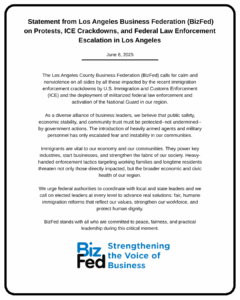Los Angeles County’s stormwater tax is not ready

For the last two years, the Los Angeles County Board of Supervisors has been quietly developing a $10 billion property tax scheme that is supposed to clean up stormwater to prevent ocean pollution and create a local source of water supply for the county’s 10 million people.
It’s an ambitious goal. Done properly, it could achieve the dual objectives of reducing stormwater pollution, (which has been mandated by the federal and state governments, without providing funding) and reusing clean water to serve our drought prone Southern California region. Building a system to capture and treat the annual 15 days of rain will require an expensive retrofit of our existing storm drain and sewer system. A well-conceived plan could also allow us to treat the even greater volume of polluted water that flows in our gutters the other 350 days a year as well.
There is no shortage of ideas on how to do this, or on the number of organizations who want a piece of the funding. Unfortunately, in the rush to please everyone by handing out money, the county has lost sight of the objective. They have unnecessarily added hundreds of millions of dollars to the cost of the program by tacking on projects that have nothing to do with clean water goals. In addition, the tax would unfairly hit many property owners that are already eliminating water pollution.
A huge share of the proposed $300 million annual tax burden will fall on the commercial, industrial and multi-family residential properties in the county. For years, property owners working through the Los Angeles County Business Federation, BizFed, have been vocal advocates for a program that is both fair and helps solve our water pollution problems
The county’s efforts have fallen short. They have neither done the work to clearly understand the problem nor to develop the right response to it. Instead, they have developed a bloated tax scheme that spends money on other luxury programs before they finish cleaning up our dirty stormwater and capturing it before it runs to the ocean. Additionally, BizFed believes that if the government requirements were properly updated with today’s science and technology the cost of achieving the goal could be substantially reduced.
Slapping just any tax proposal on this November’s ballot will not achieve the two-thirds vote required for passage. As major payers, the business community is not going to support a tax that does not prioritize compliance of reducing pollution and increasing supply above all else. The current proposal does not do that well, and it dilutes the funding by adding a myriad of non-compliance objectives like rain barrels in our desert climate, boat ramps to improve water access, and neighborhood amenities that don’t solve our problem.
Missing from the county’s proposal is a real plan. There are no projects proposed. There are no time lines. There are no measurable goals. It is not even clear how much in new taxes each property owner will have to pay. Frankly, this is a “pig in a poke” and is not the right way to address this problem. Voters will not be told what exactly they are funding, when they can expect results and what it is going to really cost. Nor is there a definite sunset or dusk for the tax. This will be a tax in perpetuity. Even after the problems are addressed, the tax will remain. Plus, there is a lack of a reasonable tax rebate for those who have already made investments to eliminate and/or treat their stormwater runoff, a lack of an implementation ordinance, and no independent oversight body with finance, construction, design, and engineering expertise to protect the taxpayers’ dollars. It is quite clear that the proposal is far from ready to be presented to the voters.
BizFed, a not for profit business association of 170 business organizations representing 390,000 employers with 3.5 million employees throughout Los Angeles County, has a history of supporting special taxes that are clearly defined for the voters, solve specific issues, and have appropriate oversight, such as Measure H for homelessness and Measure M for transportation. Each agency worked closely with the business community as partners to craft appropriate measures that benefit all tax payers.We have been engaged in a two-year process and the county has not provided the details required to fully define the tax. We are out of time. Rushing to a decision by July 10th is ill-advised. The county has had plenty of time to get it right but failed to do so. Finding partial solutions or ignoring key concerns over these final three weeks to make the November ballot will not make better public policy. There is too much at stake to risk defeat in November. Take the time to get it right and go to the voters with the business community and a united front at a later election.
David Fleming is the founding chair of the Los Angeles County Business Federation, an alliance of 170 business groups from around Los Angeles County that represent 390,000 companies, employing 4 million people.
